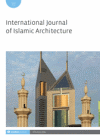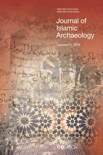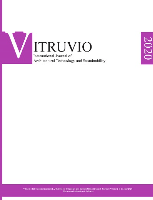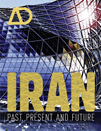
International Journal of Islamic Architecture
Scope & Guideline
Cultivating Interdisciplinary Insights into Islamic Design
Introduction
Aims and Scopes
- Exploration of Historical Islamic Architecture:
The journal publishes research that delves into historical architectural practices across the Islamic world, analyzing significant structures, urban planning, and cultural influences that have shaped architectural identities. - Contemporary Architectural Practices:
A focus on modern interpretations and adaptations of Islamic architectural principles, including the integration of contemporary design methodologies while respecting traditional values and cultural contexts. - Interdisciplinary Approaches:
Encouragement of interdisciplinary research that connects architecture with fields such as history, art, sociology, and environmental studies to explore the complexities of built environments in Islamic contexts. - Cultural Heritage and Preservation:
Emphasis on the importance of cultural heritage, including studies on conservation practices and the impact of globalization and urbanization on traditional Islamic architectures. - Sociopolitical Contexts of Architecture:
Research that investigates the influence of sociopolitical factors on architectural development, including colonial legacies, nationalism, and identity politics within Islamic societies.
Trending and Emerging
- Climate Change and Architecture:
An increasing number of studies are addressing the impact of climate change on architectural practices within Islamic contexts, exploring sustainable design solutions and adaptation strategies. - Migration and Refugee Architecture:
Research focusing on the architectural responses to migration and displacement, particularly in the context of Syrian refugees, is gaining traction, highlighting the intersection of architecture, identity, and social justice. - Digital Technologies in Architecture:
The integration of digital technologies and parametric design in Islamic architecture is a growing theme, emphasizing innovative approaches to design and representation in contemporary practice. - Cultural Heritage and Urban Regeneration:
A rising interest in the role of cultural heritage in urban regeneration efforts, particularly in historic cities, is evident, reflecting a broader trend towards sustainable urban development. - Political and Social Activism in Architecture:
There is a notable trend towards examining the role of architecture as a form of political and social activism, with scholars investigating how built environments can foster community engagement and resilience.
Declining or Waning
- Traditional Theoretical Frameworks:
There seems to be a waning emphasis on classical theoretical frameworks in Islamic architecture, with researchers increasingly seeking innovative approaches that transcend conventional narratives. - Static Historical Narratives:
The journal has seen a decline in papers strictly adhering to static historical narratives without engaging with contemporary implications or interdisciplinary perspectives. - Regional Studies with Limited Scope:
Research focused narrowly on specific regions or time periods without broader contextualization is becoming less common, indicating a shift towards more global and interconnected studies. - Purely Aesthetic Analyses:
There is a noticeable reduction in studies that focus solely on the aesthetic aspects of Islamic architecture, as scholars are now prioritizing functional, social, and environmental considerations. - Overemphasis on Architectural Styles:
An overemphasis on categorizing architectural styles is diminishing, as the field moves towards understanding the socio-cultural dynamics that shape architecture beyond stylistic classifications.
Similar Journals

ArcHistoR-Architecture History Restoration
Exploring the Intersection of Architecture and HistoryArcHistoR-Architecture History Restoration is an esteemed open-access journal published by UNIV MEDITERRANEA REGGIO CALABRIA since 2014, focused on the multifaceted domains of architecture, history, and visual arts. This journal serves as a vital platform for the dissemination of research findings, innovative methodologies, and critical discussions surrounding the restoration and history of architectural practices, appealing to a diverse audience of researchers, professionals, and students in these fields. With a commitment to scholarly excellence, ArcHistoR has positioned itself within the academic community, reflected in its ranking in the 2023 category quartiles, where it secured Q4 in Architecture and Q3 in both History and Visual Arts and Performing Arts. The journal facilitates global collaboration and knowledge sharing in its areas of expertise, further underscoring its relevance and significance. Based in Italy, effective communication and cooperation in the restoration community can flourish through the journal's purview. For those dedicated to expanding their understanding and contributing to the discourse on architectural history and restoration, ArcHistoR is an invaluable resource.

Journal of Islamic Archaeology
Connecting Cultures Through Archaeological InsightsJournal of Islamic Archaeology is a distinguished publication dedicated to advancing the field of archaeology through the lens of Islamic heritage and culture. Published by EQUINOX PUBLISHING LTD, this journal provides a platform for researchers, professionals, and students to disseminate their findings and engage in critical dialogue regarding the archaeological aspects of Islamic societies from 2014 to the present. With an ISSN of 2051-9710 and E-ISSN 2051-9729, the journal is indexed within significant academic databases and positioned notably in the Q3 and Q2 quartiles for archaeology in the Arts and Humanities and Social Sciences categories, respectively. The journal fosters scholarly exchange and innovation, drawing attention to the rich tapestry of Islamic archaeology, and securing its role as an essential resource for practitioners and academics alike. Its commitment to rigorous peer-review and high-quality contributions ensures a valuable repository of knowledge, enhancing the understanding of an often underrepresented field in archaeology.

Architecture and Culture
Illuminating the Cultural Dimensions of ArchitectureArchitecture and Culture is an esteemed journal published by Routledge Journals, Taylor & Francis Ltd, focusing on the intersection of architecture, cultural studies, urbanism, and the visual and performing arts. Since its inception, this journal has become a vital platform for researchers, professionals, and students to explore the multifaceted relationship between architecture and cultural identity within contemporary contexts. With an ISSN of 2050-7828 and an E-ISSN of 2050-7836, the journal reaches a global audience from its base in the United Kingdom. Featuring a commendable Q2 ranking in Visual Arts and Performing Arts and a consistent presence in multiple relevant quartiles, including Q3 in both Architecture and Cultural Studies, it is well-regarded for its scholarly impact. The journal offers a unique opportunity for interdisciplinary dialogue, fostering innovative research that examines how built environments shape and are shaped by cultural narratives. This commitment to advancing knowledge in these fields is reflected in its ongoing publication from 2014 to 2024, making it a pivotal resource for those at the forefront of the discourse on architecture and culture.

ABE Journal
Fostering Innovation in Art ResearchABE Journal, ISSN 2275-6639 (E-ISSN 2275-6639), is an esteemed open-access publication emerging from the collaborative efforts of INVISU-CNRS-INHA and the Institut National d'Histoire de l'Art located in Paris, France. Since its inception in 2012, the journal has facilitated unrestricted access to groundbreaking research in the fields of art history and visual studies, making significant contributions to interdisciplinary scholarship. With a commitment to disseminating high-quality research, ABE Journal plays a crucial role in fostering dialogue among scholars, practitioners, and students alike. Its diverse range of articles underscores the innovation and evolution within the art historical discourse, as it seeks to engage an international audience eager to explore contemporary methodologies and practices. The journal not only enhances accessibility to vital research but also aims to elevate academic standards within its field, making it a vital resource for those seeking to stay at the forefront of art history and visual culture.

VITRUVIO-International Journal of Architectural Technology and Sustainability
Advancing sustainable design for a better tomorrow.Welcome to the VITRUVIO-International Journal of Architectural Technology and Sustainability, a leading open-access journal published by UNIV POLITECNICA VALENCIA, EDITORIAL UPV since 2015 and based in Spain. With its ISSN 2444-9091, this journal is dedicated to advancing the field of architectural technology and sustainability, providing a vital platform for researchers, professionals, and students alike. The journal has made significant strides in the academic landscape, achieving a Q3 ranking in Architecture and a Q4 ranking in Building and Construction for 2023. It features a diverse range of scholarly articles that explore innovative practices, cutting-edge research, and sustainable solutions in architecture. With a Scopus ranking placing it at #70/189 in Architecture and #161/223 in Building and Construction, it is positioned within the 63rd percentile and 28th percentile respectively, demonstrating its increasing impact in these vital fields. We invite you to engage with our content and contribute to the ongoing discourse around sustainability in architectural practice.

Journal of Architecture and Planning -King Saud University
Exploring Innovations in Architecture and Urban Planning.Journal of Architecture and Planning, published by King Saud University Press, serves as a critical platform for scholarly dialogue and innovation within the field of architecture and urban planning. This peer-reviewed journal, bearing the ISSN 1018-3604, aims to disseminate high-quality research that addresses contemporary challenges in architectural design, environmental sustainability, and urban development. Situated in Riyadh, Saudi Arabia, this journal not only highlights regional architectural practices but also fosters global discussions, making it an essential resource for researchers, professionals, and students alike. Although currently not open access, the journal is dedicated to providing extensive coverage of the latest findings and theoretical advancements in architecture and planning, paving the way for impactful contributions that can transform communities and enhance the built environment.

Disegnare Idee Immagini-Ideas Images
Bridging Disciplines: Where Ideas Meet ImageryDisegnare Idee Immagini-Ideas Images is a distinguished academic journal published by GANGEMI EDITORE SPA, specializing in the fields of Architecture, Visual Arts, and Performing Arts. With an ISSN of 1123-9247, this journal serves as a vital platform for the dissemination of innovative ideas and research findings in these dynamic disciplines. Over its publication span from 2009 to 2023, it has established itself in the academic community, achieving a respectable ranking in the third quartile for Architecture and second quartile for Visual Arts and Performing Arts as of 2023. Although not an Open Access journal, it offers rich content that appeals to researchers, professionals, and students alike, fostering collaboration and dialogue among scholars in Italy and beyond. The journal is an invaluable resource for those looking to explore the intersections of design and artistic expression.

ARCHITECTURAL DESIGN
Exploring the Intersection of Architecture and ArtARCHITECTURAL DESIGN, a leading journal published by Wiley Periodicals, Inc., serves as a vital platform for discourse in the fields of architecture and visual arts. With an ISSN of 0003-8504 and an E-ISSN of 1554-2769, this esteemed publication offers comprehensive insights into contemporary design practices and emerging architectural theories. Established in the United States and continuously evolving from 2002 to 2024, the journal has secured a prominent position with a Q3 status in Architecture and an impressive Q1 ranking in Visual Arts and Performing Arts as of 2023. Its Scopus rankings further affirm its relevance, with a percentile ranking of 82nd in the Visual Arts category. Although it does not currently offer Open Access options, the journal remains dedicated to disseminating high-caliber research and innovative design strategies that engage a diverse readership of researchers, professionals, and students alike. The contributions published within its pages are instrumental in shaping the discourse around architecture, making ARCHITECTURAL DESIGN an indispensable resource for anyone passionate about the built environment.

Festival dell Architettura Magazine
Illuminating Contemporary Architectural ThoughtFestival dell Architettura Magazine, published by FESTIVAL ARCHITETTURA EDIZIONI, is a distinctive Open Access journal dedicated to the realms of architecture, urban studies, and the visual and performing arts. Established with a vision to foster interdisciplinary dialogue, the journal has been a part of the academic landscape since 2013 and has converged its insightful contributions from 2018 to 2023. Despite being ranked in the lower quartiles in its respective categories—Q4 in Architecture and Urban Studies, and Q3 in Visual Arts and Performing Arts—this publication remains vital for emerging researchers and seasoned professionals alike, as it provides a platform for innovative ideas and practices from Italy and beyond. It serves as a key resource for those who wish to engage with contemporary architectural thought and cultural expressions, facilitating open access to research that highlights the intersections of space, society, and art.

EGE-Revista de Expresion Grafica en la Edificacion
Enhancing understanding of graphical techniques in construction.EGE-Revista de Expresion Grafica en la Edificacion, published by UNIV POLITECNICA VALENCIA, EDITORIAL UPV, is a distinguished open-access journal that has been contributing to the field of graphic expression in building design and architecture since 1999. With an ISSN of 1888-8143 and an E-ISSN of 2605-082X, this journal aims to publish innovative research and scholarly articles that enhance the understanding and application of graphical techniques in the construction and design sectors. As part of the reputable editorial portfolio of Universitat Politècnica de València, it holds a significant place among professionals, researchers, and students interested in architectural expression, visualization methodologies, and digital tools in the built environment. The open-access nature of EGE ensures that high-quality research is accessible to a broad audience, fostering collaboration and knowledge sharing within the academic community and industry alike.